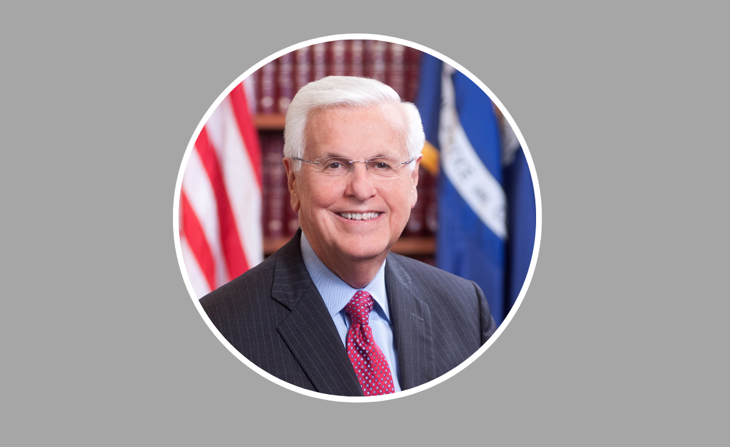
Jim Donelon: The Louisiana Department of Insurance (LDI) has a mission to enforce the insurance laws and regulations of the state impartially, honestly, and expeditiously. The LDI works to balance the needs of insurance consumers with the insurance industry's requirement of operating profitably. We work to protect policyholders by overseeing insurer compliance with state laws and regulations while striving to build a competitive marketplace so insurance is affordable.
The department is headed by an elected insurance commissioner that serves a four-year term with no limits. The LDI is then organised by various offices and divisions, led by deputy commissioners, managers, and directors. The LDI houses the following offices: Consumer Advocacy and Diversity, Licensing, Financial Solvency, Consumer Services, Management and Finance, Health Life and Annuity, Property and Casualty, Insurance Fraud, and a new Office of Policy, Innovation and Research.
I have served as Commissioner of Insurance for the state of Louisiana for 17 years now. I was first appointed as Insurance Commissioner in February 2006 when the seat was vacated by the incumbent. I was later elected to fill the unexpired term in 2006 – and have been re-elected to four consecutive full terms in 2007, 2011, 2015, and 2019.
My current term will expire at the end of the year, and I have decided to not seek re-election. I made that decision for two reasons. The first is to remove politics from the vitally important upcoming legislative session, where many significant issues affecting the future of our state’s property insurance market will be debated. The second reason is that I am 78 years old and have spent almost 50 years serving the public of Louisiana. While healthy, I want to enjoy the remaining years of my life with my family and hopefully some new hobbies.
"We get more hurricanes on a per-capita basis than any other state and the past
two seasons have been the most devastating since Katrina and Rita in 2005."
Prior to becoming Commissioner, I served in several leadership positions within the Department of Insurance – including Chief Deputy Commissioner and Executive Counsel. I also served in the Louisiana House of Representatives from 1981-2001 as Chairman of the Committee on Insurance.
Jim: We get hit more by hurricanes on a per-capita basis than any other state by far, and the past two hurricane seasons have been the most devastating for Louisiana since Katrina and Rita in 2005. Though we had 15 years of relatively quiet hurricane seasons, Laura and Ida were the second most powerful storms in history with 150 mph winds, which devastated south Louisiana in 2020 and 2021. Laura resulted in $10.6 billion in insurance losses and Ida caused over $13.1 billion.
The impact of these storms led to the worst homeowners insurance market since 2005. Several insurance companies with Louisiana policyholders failed in the aftermath of these hurricanes, and many insurers who stayed have temporarily stopped writing new policies.
Hundreds of thousands of homeowners in our state are experiencing either skyrocketing insurance costs or a lack of options, both of which are only being made worse by inflation and the high cost of living. It is a serious concern, and many homeowners are unsure whether they can afford to continue living in their home.
A short term solution to this crisis is the Insure Louisiana Incentive Program, which offers grants to insurers to write new policies in Louisiana. The programme is designed to offer immediate relief to consumers experiencing unaffordable rates for homeowners insurance, especially those in Louisiana Citizens. Eight companies are currently approved for the first round of the programme.
A long-term solution is the Louisiana Fortify Homes Program. Last year, Chairman Mike Huval introduced a bill to establish the new Louisiana Fortify Homes Program within the Department of Insurance. Under this programme, Louisiana residents can apply for grants to retrofit their roofs using methods that meet or exceed the fortified home standards of the Insurance Institute for Business and Home Safety.
We believe this programme will help a lot of people resist storm damage in the near future while potentially reducing residential property insurance costs for the entire state in the longer term. We hope it will also encourage more people to consider building to the FORTIFIED standard moving forward.
"Louisiana has not experienced any difficulties in the legislative
process regarding investments. Actually, it’s been the opposite."
Funding the programme is the priority this session. We've been working on the infrastructure needed to administer the grants, so we should see this programme get underway rather quickly once we obtain funding.
Jim: Louisiana has not experienced any difficulties in the legislative process regarding investments. Actually, it’s been the opposite.
In 2021, we modernised our investment statutes to be more in line with National Association of Insurance Commissioners (NAIC) Model laws. The LDI worked with a representative group of Louisiana-domiciled insurers, along with investment professionals and trade groups on the legislation.
"The negative Interest Maintenance Reserves (IMR) resulting from increasing interest rates is not permitted to be reported as an asset."
Jim: It is too early to tell what impact the recent banking failures will have on insurer portfolios – as it’s a relatively new development.
One big, ongoing discussion topic is related to negative Interest Maintenance Reserves (IMR). Under current statutory accounting, the negative IMR resulting from increasing interest rates is not permitted to be reported as an asset. Discussions are ongoing with several NAIC task forces and working groups, principally Statutory Accounting Principles Working Group and the Life Actuarial Task Force.
Jim: In Louisiana, we tend to see an over-investment in Louisiana-based securities – primarily municipal bonds.
This is due to significant premium tax credits being permitted for specified level of investment in Louisiana-based investments, which means it’s critical that each insurer assess any premium tax credits received in light of other investment classes that may provide better returns.